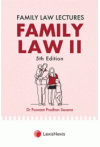- Author(s): Poonam Pradhan Saxena
- Publisher: LexisNexis
- Edition: 5 Ed Rp 2025
- ISBN 13 9789391211660
- Approx. Pages 648 + Contents
- Format Paperback
- Approx. Product Size 24 x 16 cms
- Delivery Time 3-5 working days (within Kerala & South India) (Others 7-9 days)
- Shipping Charge Extra (see Shopping Cart)
............................................................................................
Description
The judicial interpretations in the domain of Family Law II, since the publication of the Fourth Edition around three years back, and notwithstanding the absence of legislative modifications, have been varied and impactful. It has been around more than 16 years that a Hindu daughter gained entry in the classical concept of Mitakshara (male only) coparcenary, yet her rights and entitlements that ooze a legislative clarity saw imposition of unnecessary and unwarranted judicial stipulations. Past year witnessed crystallization of her right by a powerful pronouncement by the Apex Court in the shape of Vineeta Sharma v Rakesh Sharma' laying to rest the conflicting and surprising judgments rendered by its own earlier benches. Hopefully that would set at rest the confusion created by the earlier pronouncements and facilitate consolidation of her status and property in tune with the legislative accord. It is heartening to note that more and more aughters have started to come out of their shell and are breaking the social stereotypes and shackles of an obligatory relinquishment of their legitimate shares in favor of their brothers. Judiciary is actively supporting them as well in claiming their lawful shares. Withthe continuation of Hindu joint family and coparcenary, the ownership of two kinds of property by a Hindu carries on, viz, a share in the coparcenary property and separate property and even though the classification of both is distinct and clear, a confusion still persists in categorization of property and its devolution linked with the sex of the holder. The legislative mandate of application of a notional partition at the time of the demise of an undivided male coparcener, automatically converts his undivided share into his separate property with his class-I heirs acquiring it, resulting in a complete abolition of application of Doctrine of Survivorship. However the devolution of an undivided interest in Mitakshara coparcenary in case of a female coparcener is still unclear, as her share in the event of her death as an undivided member of the coparcenary does not go to her primary heirs, that includes her husband but would go only to her children or/and children of deceased children. Judicial precedents suggest application of doctrine of survivorship if a female coparcener dies issueless (even if she was married) which stands in a sharp contradiction to the legislative consequences in case of death of a male coparcener. The complete exclusion of the spouse of a female intestate with respect to the share in coparcenary property, and inclusion of spouse of a male coparcener in an identical situation actually creates a distinction between the rights of a son and a daughter in a Mitakshara coparcenary, that is contradictory to what the legislature intended.
............................................................................................
Contents
Part I : Introduction
Law of Intestate and Testamentary Succession in India
Part II : Hindu Law
Chapter 1 : Sources of Hindu Law
Chapter 2 : Hindu Joint Family
Chapter 3 : Coparcenary
Chapter 4 : Dayabhaga Joint Family
Chapter 5 : Categorisation of Properties
Chapter 6 : Karta
Chapter 7 : Trading Families
Chapter 8 : Alienation of Joint Family Property
Chapter 9 : Son's Liability to Pay Father's Debts
Chapter 10 : Partition
Chapter 11 : Legislative Interventions in the Concept of Hindu Joint Family and the Coparcenary
Chapter 12 : Hindu Succession Act, 1956
Part III : Muslim Law
Chapter 13 : Muslim Law
Chapter 14 : Gifts
Chapter 15 : Wills (Wasiyat)
Chapter 16 : Gifts made during Marz-UL-Maut
Chapter 17 : Inheritance
Part IV : Annexures
ANNEXURE I The Caste Disabilities Removal Act, 1850
ANNEXURE II The Hindu Inheritance (Removal of Disabilities) Act,1928
ANNEXURE III The Hindu Gains of Learning Act, 1930
ANNEXURE IV The Hindu Succession Act, 1956
ANNEXURE V The Muslim Personal Law (Shariat) Application Act, 1937
Subject Index
............................................................................................
Author Details
Poonam Pradhan Saxena is presently the Vice Chancellor of National Law University, Jodhpur. She is a former professor of University of Delhi, Faculty of Law and is in the teaching and administrative position for the past 39 years. She is a Senior Fulbright Scholar and a Visiting Faculty at the University of Baltimore, Maryland, USA. She is also a Shastri- Canadian fellow pursuant to which she had delivered lectures in eleven different universities across Canada. A prolific writer, she has also contributed the books on Family Law-I, Property Law and has revised Mulla's Transfer of Property Act, 1882. In addition she has authored four volumes on Halsbury's Laws of India, namely, Property Law and Easements, Trusts and Charities, Family Law-I and Family Law -ll all published by LexisNexis. She has presented her views in several conferences both at the National and International Levels. Her articles have been published in several leading Indian and Foreign Law Journals and Books.

